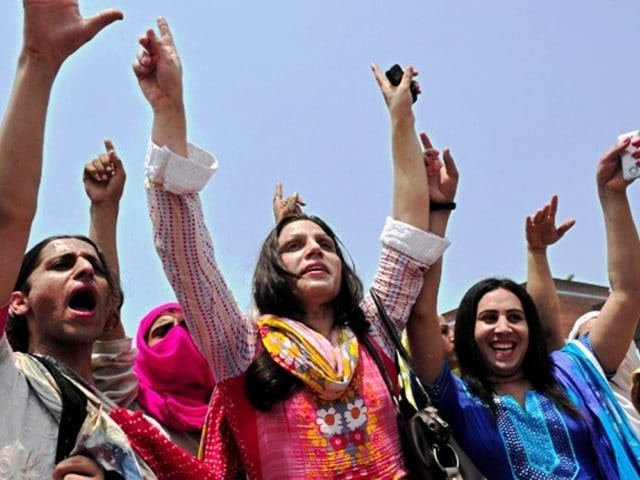In a first, K-P pledges designated seats in BRT buses for transgenders
Those identifying as women will be given designated seats in the women’s compartment and vice versa

Transgender individuals face a host of problems as they navigate public spaces in the country from sexual harassment to teasing to threats. PHOTO: AFP
The decision was taken in a K-P Social Welfare department consultative meeting on Friday. Representatives of the transgender community, civil society organisations and government officials met to take recommendations and chalk out a plan to facilitate transgender persons in BRT buses.
The provincial government announced that the public transport project will be launched on October 20, and accommodate more than 0.4 million passengers daily in its fleet of more than 400 buses.
K-P transgender protection policy proposes 2% seats in local govt
Quoting Social Welfare Director Abidullah Kakakhel, a press release issued by Trans Action Alliance stated that the K-P government continues to hear troubling stories from transgender travellers about the treatment they receive during their commute.
“The provincial government will ensure that all public transportation schemes are transgender-friendly and state laws prohibit such treatment which makes public spaces inaccessible for transgender community,” Kakakhel pledged, according to the statement.
Qamar Naseem, board member of Trans Action Alliance, confirmed to The Express Tribune that the government has pledged designated seats for transgender travellers – those who identify as women will be given designated seats in the women’s compartment while those who identify as men will be given separate seats in the men’s section.
Naseem added that it was recommended in the meeting that free tickets be given to transgenders to encourage them to use the BRT system. “Currently, transgenders do not use public transport frequently because of harassment and bullying from people,” he said.
The rights activists added that the provision of employment opportunities in the BRT project was also discussed at the meeting, i.e. postings at ticketing booths or other relevant departments.
Transgender individuals face a host of problems as they navigate public spaces in the country from sexual harassment to teasing to threats, violence and general disdain.
Police sub-inspector suspended for harassing transgender
“A distinctly unpleasant experience such as getting a seat in a crowded bus is a small victory that one [transgender], which they may celebrate in their heart, but if the person seated next to you is stern looking and constantly stares at you for no apparent reason, this victory might turn into uneasiness,” said Farzana Jan, President K-P Transgender Association.
She explained that because of issues like these, transgenders rarely travel in public transport, preferring to use rickshaws or taxis instead which charge them more than double what they would charge other passengers.
“Sometimes buses do not even allow transgenders on board because of their gender non-conformity,” she added.
Jan said that on behalf of the transgender community, she was thankful to the K-P government for expressing interest in facilitating travelling for them in the new transport project.




1725254039-0/Untitled-design-(24)1725254039-0-208x130.webp)














COMMENTS
Comments are moderated and generally will be posted if they are on-topic and not abusive.
For more information, please see our Comments FAQ